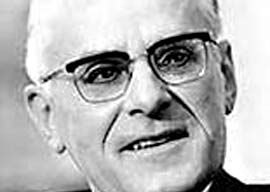
September 14, 2015

Earl Butz
Perhaps my favorite mental pastime is studying the long, stupid, twisted arc of how social taboos develop. What’s especially fascinating to me is how what’s considered sacred and profane can completely flip sides in only a generation or two. When I was a kid, it was considered socially obscene to talk explicitly about sex, to endorse communism, to consider black people our equals, to say anything bad about Jesus, or to think that homosexuality was anything other than a sickness.
Hoo-doggie, have things changed. These days, sluts, commies, blacks, Christ-bashers, and gayrods are venerated as sacred and untouchable icons of the new order. Prudes, capitalists, whites, and heterosexual “breeders” have taken their place as acceptable targets of public derision.
Nowadays the PC witch hunts are so persistent it’s almost insulting to refer to them as Two Minutes Hate. It’s Nonstop Hate.
I’ve scanned my moldy memory banks trying to determine what was the first highly publicized scandal wherein someone lost their job for saying something offensive to leftist dogma, and the earliest one I can recall was the public resignation of the wonderfully named US Secretary of Agriculture Earl Butz in 1976.
Two years earlier, Butz had faced a minor backlash with a comment he uttered in his best Chico Marx accent about how the Pope should have no say in population control because “He no play-a the game, he no make-a the rules.” At the time, people took offense not so much at the fake Italian accent as at the disrespect for the Pontiff.
But that wasn’t the comment that cost him his job. Butz fell flat on his butt after serial Republican snitch John Dean published a 1976 article in Rolling Stone about a flight he’d taken with Butz, Pat Boone, and Sonny Bono. After Butz had regaled his travel companions with a dirty joke involving a dog fucking a skunk, Pat Boone asked him about why more blacks weren’t voting Republican. Dean reports that this was Butz’s response:
I’ll tell you what the coloreds want. It’s three things: first, a tight pussy; second, loose shoes; and third, a warm place to shit.
Vulgar? Sure. Untrue? I’m not so sure at all. If I had to guess, I’d say that at any given moment in world history, at least 90% of sensible adult men, regardless of their race, desire those three things.
Butz’s comment was publicized nationwide by the AP”who reprinted it verbatim, although only two American papers followed suit. What’s interesting is that in 1976, the words that nearly every newspaper in the country bowdlerized were “pussy” and “shit.” They either inserted asterisks or parenthetical substitutions such as “[obscenity] and “[warm toilet seats].” But these days, “pussy” and “shit” would be far less offensive to the average oversocialized ear than is the word “coloreds.” Ah, progress. It appears that something will always offend the shit out of these pussies.
Butz resigned in shame, and America officially entered the Butz Era”one from which it has obviously yet to exit.
Timothy Noah of Slate referred to the Butz incident as “epochal”:
Before Butz, there remained a snickering tolerance among the powerful for jokes denigrating the humanity of blacks, Jews, and homosexuals. After Butz”well, the jokes about gays limped along for awhile, but it finally sank in that racism and anti-Semitism would seldom be tolerated, even in private.
While I was smacking the heel of my palm against the side of my head trying to remember other early instances in which politically incorrect statements led to loss of employment, my brain coughed up an additional trio of scandals from the 1980s. All of them involved men in the sports world.
I doubt there will ever be another sportscaster with a better flair for the dramatic than Howard Cosell. His years of verbal sparring with Muhammad Ali made for some of the best TV in history. During a 1973 episode of Monday Night Football“three years before Earl Butz’s cultural excommunication”Cosell said, “Look at that little monkey run!” in reference to a black player’s 97-yard kickoff return. He also referred to a white athlete as a “little monkey” around the same time. There was no outrage about this in 1973, though. Why should there have been? Monkeys are cute!
But ten years later, the cultural pendulum had swung hard to the other side. “That little monkey gets loose, doesn’t he?” Cosell remarked about black wide receiver Alvin Garrett. This time around, there were cries for Cosell’s toupee-swaddled head. ABC dismissed Cosell at the end of the season. It had been his fourteenth year announcing for Monday Night Football. All of it, apparently, was gone with the flick of a monkey’s tail.
Al Campanis had been with the Los Angeles Dodgers organization since the early 1940s until that fateful 1987 TV interview on ABC’s Nightline when Ted Koppel quizzed him about why there weren’t more black managers and owners in baseball. Campanis’s response:
No, I don”t believe it’s prejudice, I truly believe that they may not have some of the, uh, necessities to, uh, be, uh, let’s say a field manager or perhaps a general manager….How many quarterbacks do you have, how many pitchers do you have that are black?…It just might be that they”why are black men, or black people, not good swimmers? Because they don”t have the buoyancy.
Ever the journalist, Koppel told Campanis his remarks were “baloney” and “garbage.” Three days after making the comments, Campanis wilted under the heat of public pressure and resigned.